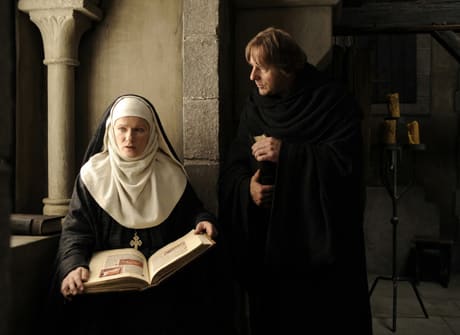Strangely, playing out as a modern day corporate corruption parable, German director Margarethe von Trotta's proto-feminist canonization of 12th Century cloistered nun and polymath Hildegard von Bingen (Barbara Sukowa) tackles female manipulation in relation to Christian male patriarchy. It spans most of the influential writer and composer's life, detailing an unconventional childhood — offered as a tithe to the church at the age of eight — all the way up to her reign as elected convent magistra and subsequent confrontation with church authorities.
Cataloguing Bingen's youthful curiosity and ambition, intrigued by the healing powers of plants and art as morality play, Vision plays as a panegyric celebration of a historical figure for its first half. But once she's in power, her best friend and confidante, Jutta (Lena Stolze), reveals her petty jealousies, suggesting fallibility within the sisterhood. This is compounded when teenage Richardis (Hannah Herzsprung) enters the convent, initially irritating her magistra and subsequently receiving ethically murky advice and lectures, eventually becoming a co-dependent, slightly unwholesome, right-hand assistant and lap dog.
Because Sukowa masterfully masks her emotion beneath the required game face of the time, we never really know what she's feeling or thinking. We get the impression that her relationship with this younger nun is based on power and reinforced validation, but no words are spoken to imply this. Similarly, the eventual use of visions from God as a tool for reform and change, leading to the construction of a separate all-female monastery for her nuns, remains consistently in a grey fugue. We can assume she used this approach to inject influence into her voice despite being a mere unlearned woman, but von Trotta carefully avoids stating this outright.
This mature approach to a true-life story with a plethora of unknowns gives maturity and mystery to the film that serve it well. While slow and occasionally challenging in its refusal to take sides, Vision gives the impression of corruption and greed as motivators without denigrating the image of its protagonist with focused intelligence. With a deliberate structure, nothing here patronizes, respecting the audience enough to fill in the blanks on their own.
(Mongrel Media)Cataloguing Bingen's youthful curiosity and ambition, intrigued by the healing powers of plants and art as morality play, Vision plays as a panegyric celebration of a historical figure for its first half. But once she's in power, her best friend and confidante, Jutta (Lena Stolze), reveals her petty jealousies, suggesting fallibility within the sisterhood. This is compounded when teenage Richardis (Hannah Herzsprung) enters the convent, initially irritating her magistra and subsequently receiving ethically murky advice and lectures, eventually becoming a co-dependent, slightly unwholesome, right-hand assistant and lap dog.
Because Sukowa masterfully masks her emotion beneath the required game face of the time, we never really know what she's feeling or thinking. We get the impression that her relationship with this younger nun is based on power and reinforced validation, but no words are spoken to imply this. Similarly, the eventual use of visions from God as a tool for reform and change, leading to the construction of a separate all-female monastery for her nuns, remains consistently in a grey fugue. We can assume she used this approach to inject influence into her voice despite being a mere unlearned woman, but von Trotta carefully avoids stating this outright.
This mature approach to a true-life story with a plethora of unknowns gives maturity and mystery to the film that serve it well. While slow and occasionally challenging in its refusal to take sides, Vision gives the impression of corruption and greed as motivators without denigrating the image of its protagonist with focused intelligence. With a deliberate structure, nothing here patronizes, respecting the audience enough to fill in the blanks on their own.
